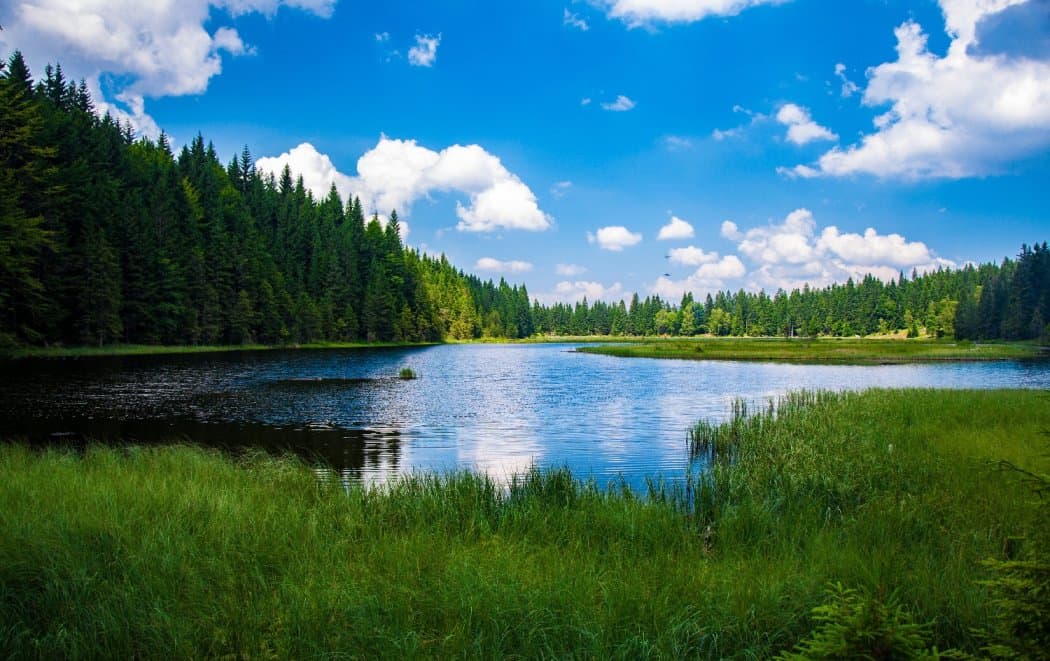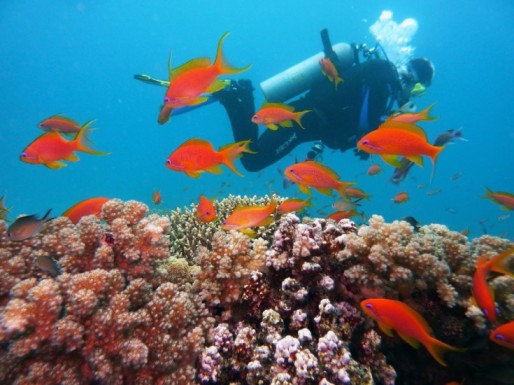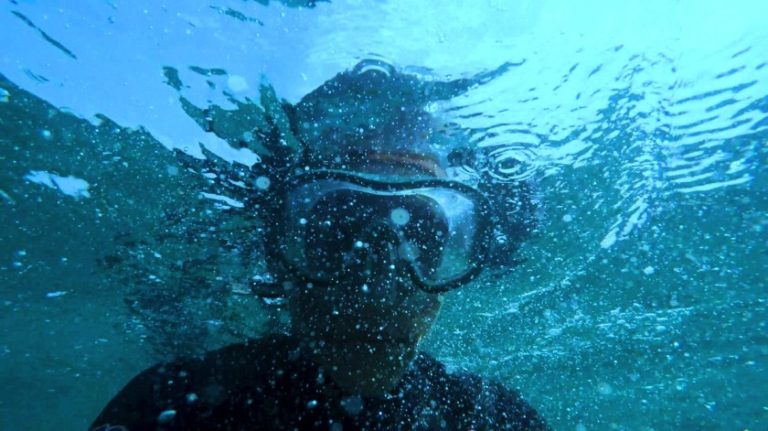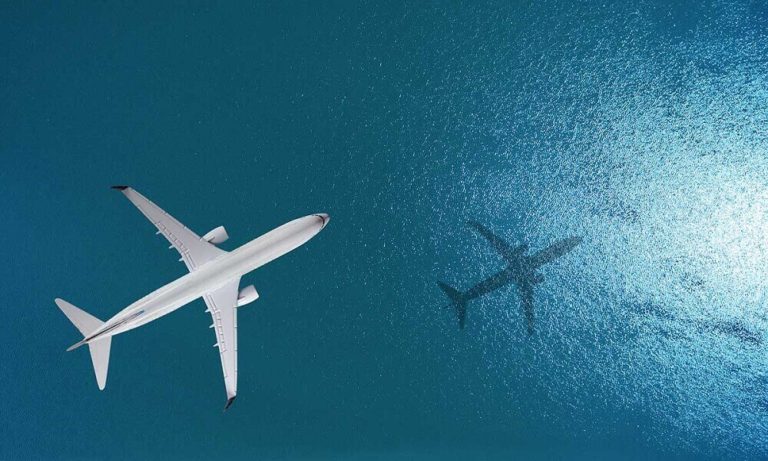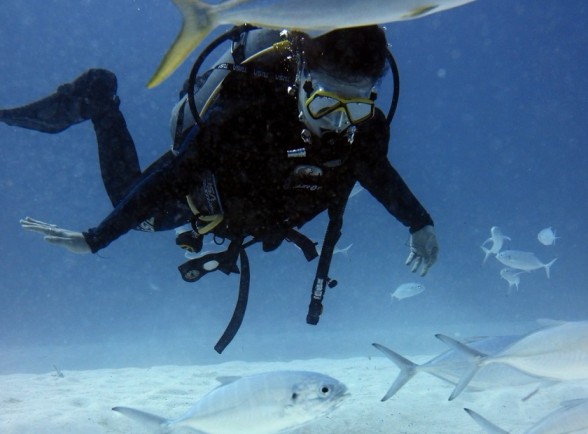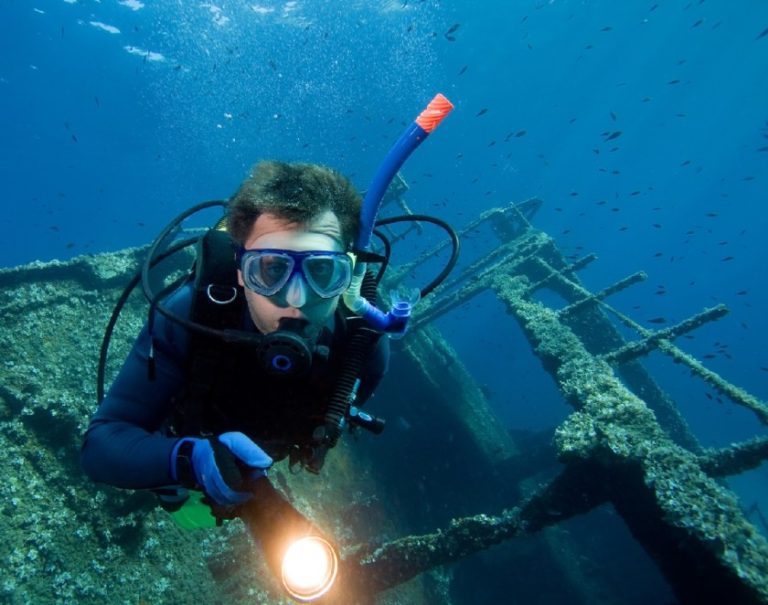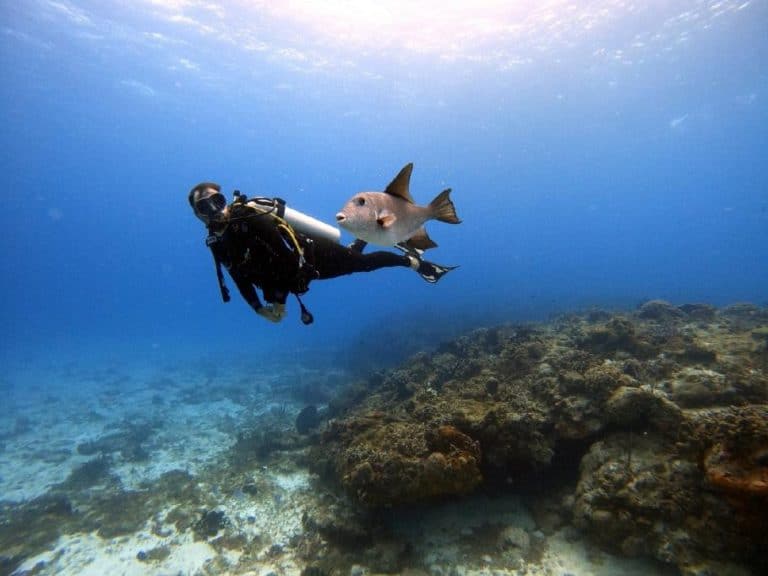Can You Scuba Dive in a Lake?
In most cases when you think about scuba diving oceans and seas are the first spots that come to mind. For most beginners and non-divers, a lake doesn’t often cross your mind as a possible diving spot. If you’ve been wondering whether you can go diving in a lake don’t worry you are in the right place. In this article, I’ll answer the question can you scuba dive in a lake, look into some factors to consider when lake diving and so much more.
The simple answer to the question is yes, you can scuba dive in a lake. However, it’s important to first research the lake conditions, the best time to go diving, the best diving spots, and also look into the location.
When diving in a lake above 1000ft. above sea level, divers have to plan their dives and use dive charts or dive watches. This prevents the risk of developing decompression sickness due to poor or no planning and avoids other diving injuries.
Lakes both fresh water and salt water lakes are great for divers who don’t have access to the oceans and want to keep working on their diving skills. In addition, if the dive training center is in a landlocked area, a lake is the next best place to train new students.
Now let’s dive deeper into lake diving, the differences compared to sea diving, and the factors to consider before going diving in a lake.
#GreenLake is a lake in #Styria, #Austria in a village named #Tragöß. The lake is surrounded by the Hochschwab Mountains and forests.#Lake #tourism #scuba #diving pic.twitter.com/vdSLtUzmKf
— Tourzy 🎫 (@tourzynet) April 5, 2018
How Is Scuba Diving In A Lake Compared To The Sea?
Scuba diving in a lake has notable differences especially if you have been scuba diving in salty waters of the oceans and seas.
On the other hand, as a beginner in training, the differences may not be very notable since you have nothing to compare them to.
The differences will range from visibility, marine life, water temperatures, currents, and accessibility among others.
In the table below, is a list of the differences you can expect when diving in a lake vs. when diving in an ocean.
READ MORE: Can You Scuba Dive in the Bermuda Triangle
Diving in Lakes |
Diving in the Sea/Ocean |
| Freshwater has lower density meaning divers carry fewer weights | Salty water is denser making objects float easily. For this reason, divers have to counter this effect by wearing heavier weights to achieve neutral buoyancy. |
| Fresh water in lakes tends to get very cold. | Salty water is warmer |
| Divers will require heavier wetsuits, diving boots, gloves, and hoodies or wear a dry suit. | Divers may require dry suits or heavier wetsuits and diving accessories when diving during the cold months and winter season. |
| Lakes have lower currents and tides making it easier for beginners | Seas and oceans often have stronger currents and tides |
| You encounter freshwater life forms such as fish and other smaller life forms. | Marine life is diverse and in plenty. You are likely to encounter many rare species diving in salty water |
| No corals in freshwater lakes | Diverse corals in different diving spots. Corals need salty water to thrive. |
| Visibility in lakes is poor in areas with high human activities such as fishing.
Lakes with no disturbances will naturally have better visibility.
During the winter season, the visibility is improved as the water in the lake remains calm
The colors are not well illuminated in the murky waters | Visibility in salty water is great and will only be interrupted when there are strong currents.
Marine life colors pop in salty water making the experience memorable |
| The bottom of the lakes is mostly made up of silt and objects dumped or lost in the water. When the bottom is disturbed, the silt makes the water murky affecting visibility.
In addition, silt becomes muddy meaning it’s difficult to see the bottom of the lake and it’s had to recover diving items lost in the silt. | The bottom in salty water is mostly sand which doesn’t affect visibility even when stirred up.
Divers can easily recover items as long as it’s within a reasonable depth.
|
| Dive spots are easily accessible | Most dive spots are accessible using a dive boat |
| Due to high fishing activities, divers have to carry a dive knife while diving to cut through lost fishing rods and seaweed | Recreational divers don’t have to carry diving knifes each time they go diving.
A dive knife is still necessary as you can help save trapped marine life and you can expect nylon rods in the sea. |
| A dive light is also necessary due to poor visibility even during the day | Dive lights are not necessary when diving during the day |
| When diving in a lake, consider the altitude and use dive computers or tables when diving in lakes above 1000 ft. above sea level | Dive computers are necessary when doing multiple dives in a short period of time or when diving over 100ft.
Recreational divers maintaining their dive limits don’t require a dive table for a single dive |
| Lake diving is less exciting since the view is limited to a few life forms | Sea diving is exciting as you encounter many types of marine life forms |
READ MORE: Can You Scuba Dive In A River?
Cheers!#scuba #scubadiving #Underwater #lake #diving #scubadiver #CHEERS pic.twitter.com/udTcemq0GS
— Uncle George Scuba (@ScubaUncle) December 11, 2021
Similarities in Lake and Sea Diving
While there are notable differences in terms of diver experience and the diving gear required, there are many similarities in both forms of diving.
- First and most importantly, you should never go scuba diving without proper training. Divers with at least an open water diver certification can go diving in lakes and the sea.
- Proper gear is very important. Consider the water temperatures, visibility, and surroundings underwater to determine the gear accessories to carry with you.
- Divers should always go diving with a buddy or in teams. Never go diving alone even if you are quite familiar with the dive spot.
- Observe all diving tips and requirements such as making safety stops, having a diver down flag, using dive tables or computers when necessary, and communicating with your buddy when facing challenges among others.
- Divers with health problems should avoid diving until they are cleared for diving.
Whether diving in a lake, river, sea, ocean, cave, or cenotes, divers must always respect and follow diving rules and requirements. Following these requirements keeps you as the diver safe and also allows everyone on the team to enjoy their time diving.
The #lake supports a variety of fauna such as snails, water fleas, small crabs, fly larvae, and different species of trout.#diving #tourism #scuba pic.twitter.com/HFNVgahSFV
— Tourzy 🎫 (@tourzynet) April 5, 2018
How Deep Can You Dive In A Lake?
Different lakes have different depths some are shallow while others are thousands of feet deep.
According to data presented online, the deepest lake in the world Lake Baikal in Siberia, Russia is over 5300 ft. / 1600 meters deep. Looking at this depth even in sea diving, it’s impossible to scuba dive to such depths.
Remember the depths will also differ in one lake, some spots are shallow while others can be over 500 ft. deep.
When diving in a lake, it’s important to know where the best diving spots are located and their depths. Diving with beginners, the diving depth should be limited to the least experienced divers limit.
Just like in sea diving, divers should dive within their limits. Since the diver is only trained to handle certain depths this is the best practice and rule to live by.
Divers wishing to explore deeper parts of the lakes can always go for advanced training. In these advanced classes, the dive is trained on how to use enriched air, and how to handle potential hazards among other forms of training.
Also thought #Lake #Bracciano was pretty cool. It’s a #dive within the #crater of a now extinct #volcano.#Italy #Europe #getdivesite #divesite #marinelife #underwater #underwaterphotography #naturephotography #scubadiving #scuba #diving #PADI #sharks #coral #Roman #freedive pic.twitter.com/JX5a0Ol5O5
— DiveSiteAdventures (@DiveSite_) June 21, 2018
READ MORE: Do You Need a Scuba Diving Knife?
Do You Need Special Diving Equipment To Dive A Lake?
As mentioned above, freshwater lakes will naturally be colder compared to salty waters. Wearing the right gear helps in keeping the diver well insulated.
Therefore, divers require thick diving wetsuits, booties, gloves, and diving hoodies (Available on Amazon) Divers with dry suit training should wear their dry suits when diving in lakes to help stay warm.
A diver without proper training on how to dive in a dry suit is likely to face buoyancy issues. It’s important to first get the training available in all diver training centers.
In addition, when going lake diving a diving flashlight and a diving flashlight (available on Amazon) are important accessories to always carry.
Someone put a Buddha statue in our training lake#scuba #diving #buddha #lake #lakepupuke https://t.co/I7t3bvKPMh pic.twitter.com/4TCfyJMDUR
— Dennis (@hildende) February 6, 2019
Factors to Consider When Lake Diving
In addition to altitude and the lake’s depths, divers should also consider other factors such as the time of the year, dams, and rivers following into the lake.
Understanding the weather and how it affects visibility in the lake helps in planning a successful dive. As mentioned earlier, during the winter months, the water is naturally calm with little human activity which affects visibility.
Lake Baikal, the deepest lake in the world is a great diving site during winter. Divers get to dive under the frozen lake with clear visibility. A diver not trained for ice diving may prefer to go diving during the summer and still enjoy the beauty the lake has to offer.
Many streams and rivers flow into lakes. As they flow down these streams bring along silt which is then deposited at the bottom of the lake. At the point of entry, you are likely to find more silt or it could be higher during rainy seasons. Understanding these conditions helps in picking the best diving spot.
If a dam releases its water into a lake, then it may be closed for scuba diving at certain points and times of the year.
The best practice is to do thorough research with the officials in charge on which spots to avoid, the best time to go scuba diving, and any other important information.
Lastly, divers should always drain all the water and clean their diving gear, boat, and diving bags before leaving the site. This helps in preventing the introduction of invasive species from one lake to the other.
While enjoying and exploring different dive sites it’s important to conserve them. Conservation goes beyond protecting marine life and corals, it also includes protection from invasive species that tend to harm the existing life forms.
READ MORE: Do You Need a Scuba Diving Flashlight?
Parting Words
We’ve looked at diving in a lake vs. diving in seawater, and we’ve also looked at some similarities and factors to consider when planning a lake dive.
Just like planning a dive in salty waters of the seas and oceans, it’s important to plan your dive and dive the plan. This way divers avoid the risks of developing DCS and other diving injuries.
If you are in a landlocked region, consider lake diving to improve your diving skills. You don’t have to visit the oceans to enjoy a dive.
In conclusion, there is a lot to discover and enjoy in different lakes don’t limit your experience to one environment.
Happy diving!!

